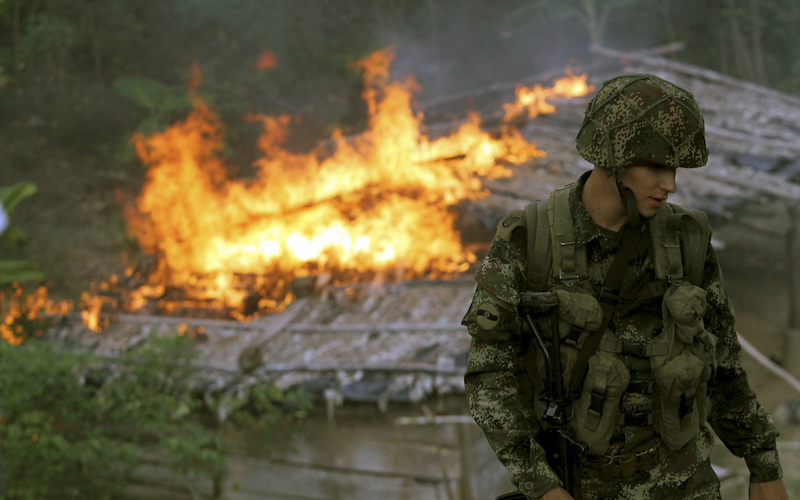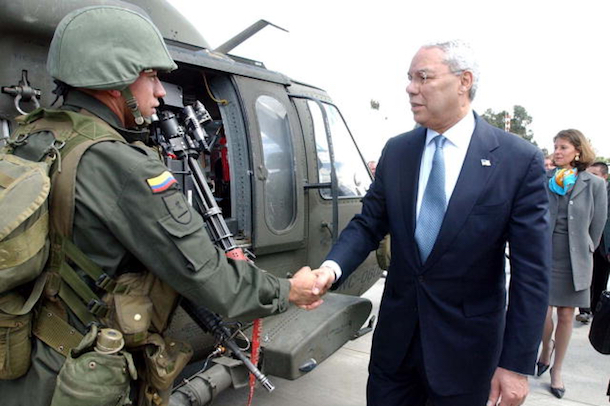
Is America Really Ready to End its Drug War?
In recent years an international movement to reform global narcotics policies has been growing, with activists and presidents alike declaring that the United States’ “war on drugs” has failed. Now it seems the US has finally gotten the message – from Latin America, at least, whose nations have long borne the brunt of international drug prohibition.
On December 16, President Barack Obama signed into law a bipartisan commission to assess four decades of US counter-narcotics policies and programmes in Latin America. The Western Hemisphere Drug Policy Commission Act, introduced by Democrat Eliot Engel and Republican Matt Salmon, represents a potentially significant shift in American foreign policy towards its southern neighbours.
American drug policy is already under indictment domestically. Eight states and Washington, DC have legalised recreational marijuana, in conflict with federal law.
In the 2016 election, supporters of state-level initiatives to regulate cannabis in California, Maine, Massachusetts and Nevada, argued that it would generate tax revenue, lower policing costs and undermine the black market.
The new commission’s comprehensive review will weigh those concerns and others internationally. It will assess the success of US drug policies in Latin America in reducing the supply and abuse of drugs, and the damages associated with illicit drug markets. It will evaluate alternative policy models and make reform recommendations.
The price of aid
Two topics within the commission’s broad mandate could lead to a shift in American aid to the region.
First, the group’s evaluation of US counter-narcotics assistance will put Plan Colombia under the microscope, a $8 billion programme created in 1999 as a strategy to combat Colombian drug cartels and left-wing insurgent groups. It will also appraise the $2.5 billion Mérida Initiative, launched by the US and Mexico in 2007 to fight drug trafficking and money laundering.
Both programmes have been criticised for causing human rights violations and conspicuously failing to prevent drug production or trafficking.

They’ve also carried a hefty price tag for the two target countries. Matching the US’s $8 billion in expenditure, Colombia has spent four times more per year on Plan Colombia than it earns in coffee exports. Mexico has increased its security and defence budget by approximately 15% per year over the past decade, investing $7.5 billion annually to fight cartels. Yet the country anticipates cuts to infrastructure, education, environment and health in 2017.
A second significant agenda item is reconsidering the “decertification” policy. This mechanism conscripts designated countries into America’s drug war by threatening them with combined aid and trade sanctions if they are determined to have “failed demonstrably” to make substantial efforts to reduce illicit drug production.
Since the 1990s, Colombia and Bolivia have both been decertified. Even the mere threat of decertification gives the US a potent weapon against reluctant governments and limits countries’ ability to alter policies they perceive to be failing.
Because we say so
In 1962 American elder statesman Dean Acheson defended the role the US played in the Cuban missile crisis, claiming that US responses to any challenge to its “power, position, and prestige” are above and beyond law.
Noam Chomsky has famously interpreted this cynical contention as the key principle of American foreign policy: US actions are legitimate whenever the US says so. Military power has thus enabled the US to always be, or claim to be, right.
That principle has been at the heart of the war on drugs since its launch by president Richard Nixon in 1971. If the Western Hemispheric Commission fulfils its mandate, it will represent an unprecedented exercise of self-criticism for a country that has employed a repertoire of bullying tactics – many of them illegal – over its four-decade international fight against narcotics.
Take the 1990s money-laundering sting “Casablanca” in Mexico, for example. In this covert operation, in which several Mexican citizens were arrested, undercover US Customs agents bribed mid-level Mexican bank employees to convert drug profits into legitimate bank accounts. It was conducted without the knowledge of the Mexican government and in violation of its federal law.
In 1989, the US military actually invaded Panama, detaining the dictator Manuel Noriega and flying him to the US to face charges for drug trafficking. US intelligence officials had known for years that Noriega was involved in the cocaine trade, but they overlooked it because of his assistance with their covert military operations in the region – until, that is, Noriega was indicted on drug trafficking charges in Florida.
The invasion provoked international outrage, with the UN General Assembly voting 75 to 20 to condemn it as a violation of international law.
Extradition, in which the US demands accused drug traffickers be brought to the US for trial, is another favoured heavy-handed policy. The governments of Mexico, Colombia, and Bolivia have at various junctures complained that extradition is an implicit vote of no confidence that undermines their own criminal justice systems.
In 1991, Colombia banned extradition as part of an agreement between the Colombian government and Pablo Escobar. Once he was guaranteed not to face trial in the US, the cartel leader immediately surrendered. The ban was overturned when president Ernesto Samper sought to restore Colombia’s US certification, which American officials had withdrawn in retaliation in 1996 and 1997–a US drug policy one-two punch.
A chance for peace?
For Latin American people the aggressive strategies of the US seem arbitrary and hypocritical coming from a country where some 24.6 million individuals – 9.4% of the population – use illicit drugs, and marijuana is increasingly legal.
Yet the war on drugs rages on, leaving hundreds of thousands of dead in its wake – because, to cite the Acheson-Chomsky principle, the US says so. At a minimum, the commission’s review could usher in more evidence-based policy.
Reducing the harms caused by current drug policies should be the guiding criterion for the commission’s work. Following Immanuel Kant’s first principle for effective pacifism, the exhaustion caused by war will not be sufficient for sustainable peace in the Western Hemisphere; rather it requires, above all else, a sincere intention to definitively end hostilities.
This means the ultimate success of the commission will depend on whether the next administration facilitates its work. Barack Obama may have set up the commission, but the ball is now in Donald Trump’s court.
This article was originally published on The Conversation. Read the original article.

